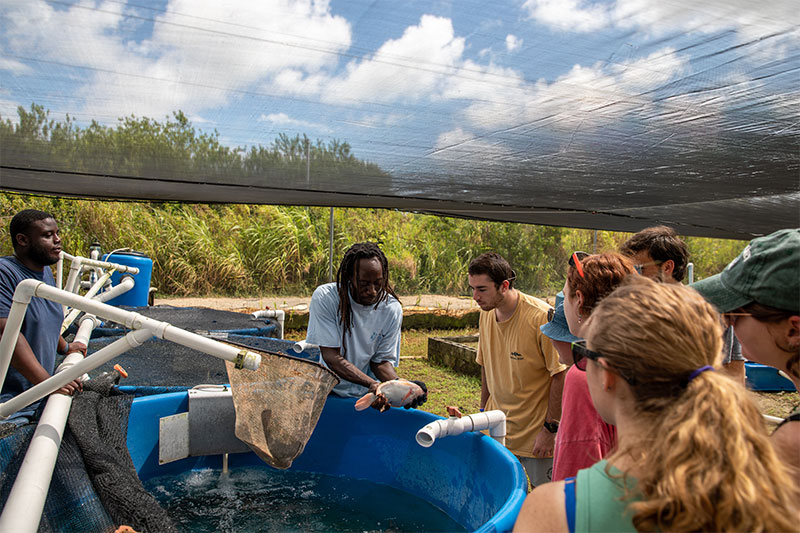
Above: Students look on as an employee of the Bahamas Agricultural and Marine Science Institute shows off a fish and explains the institute's efforts to provide their own food sources to the island nation to avoid heavy import costs.
Read time:
When Kevin Parker boarded the plane to the Bahamas this summer, he had no idea he would return a changed person.
Parker was part of a 13-day study abroad trip led by Dr. Christopher Tweedt, an assistant professor in the Department of Philosophy and Religion. The focus of the journey was to take a deep dive into how sustainability and business ethics are practiced in the Bahamas.
Parker had taken Tweedt’s class on the same topics his freshman year and fell in love with it. He could not wait to see all of the lessons from the classroom brought to life in the island nation. But Parker never expected the trip to give him a completely new perspective on life and business.
“When we left, I expected to learn exactly what the class was about: ethics and sustainability,” said Parker, ‘26 Marketing. “After witnessing what life is like in the Bahamas, I am so much more appreciative of everything I have. I realized just how fortunate I am. What we have here isn’t typical. We are blessed, down to the basics of clean air and water. I have a different outlook on life and what it means to live.”
Parker and eight other students experienced the Bahamas not only as a tourist destination, but also as a country struggling with deep-rooted poverty.
Students met with Bahamian government officials and visited several sites including the Atlantis waterpark and the Bahamas Agricultural and Marine Science Institute. The students were given an up-close look at what it takes to run a successful and ethical business in the Bahamas. They also explored what life is like outside of the tourism bubble, going to areas where working class Bahamians live and seeing the tough conditions in which they do so.
“Leaders in the Bahamas face difficult decisions, and tourist decisions have large impacts on the Bahamian people and the environment. We get to see firsthand what those problems are, what people are doing to solve them, and whether they are working,” Tweedt said. “We also have informal discussions and debates as a class about what should be done and why.”
Tweedt said the trip tends to leave a lasting impact on students. It was the third time he has taken students to the Bahamas.
“What all of the students have consistently told me was that the trip was life changing, that they wish they could do it again,” he said. “The trip is action packed and raw. It is not a relaxing beach vacation.”
Parker said it was eye opening to see the issues they had talked about in class, such as poverty and the effects of tourism on sustainability, in real time.
“In the classroom, it was like a case study,” he said. “Seeing it in real life was completely different.”
The group was exposed to vibrant and ethical business models on the three islands of the Bahamas. They also learned about businesses that did not adhere to such stellar ethics or sustainability practices. The students were able to see the positives and the negatives, and then do an analysis of each, studying practices and seeing what worked and what didn’t.
“The ethics piece was really interesting. We saw how successful businesses were ethical and very put together, and then we saw ones that were looser and not so ethical. I have always been told to do the right thing. This proved it,” Parker said. “We learned what happens when businesses do things correctly and when they do things incorrectly.”
“The ethics of business is so important,” he said “I am a firm believer in business karma, of doing things correctly.”
The experience, Tweedt said, “is designed to be perspective changing.”
“We often see countries like the Bahamas as a tourist destination, but we don’t see what’s really going on in the background,” he said.
The students visited tourist destinations and areas where native Bahamians live outside of the tourist spotlight.
“We talk to resort managers, government officials, and business owners. We talk to people who are growing coral, replenishing mangrove populations, and discovering how to keep sea animals alive,” Tweedt said. “We have excellent support and cooperation from people in the Bahamas who are happy to share what they know with us.”
Parker returned from the trip overflowing with life lessons and a renewed business acumen. As a budding entrepreneur, he plans to apply all that he learned and observed as he moves forward. Parker owns a business called KEVSCARPICS, which specializes in photographing exotic and high-end cars all over the world. He started the business when he was young, driven by his passion for cars. As a child, he learned that networking was important, and has made that the foundation of his business success. He has completed 500 car shoots since he started his business in 2017. The takeaway lessons from the trip, Parker said, will only make KEVSCARPICS stronger.
“I’m going to implement everything I learned on the trip into my business,” he said. “It taught me to take care of my followers, that an organization is nothing without followers. We saw everyone working together. Failure was not an option. They wanted to succeed. We saw how important it is in the business world to focus on your people. When you take care of your employees, they will take care of you.”